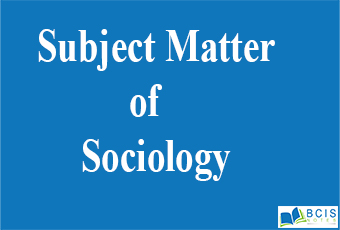
Subject Matter of Sociology or Research Domain
Subject Matter of Sociology opines that sociology does the investigation in the entire social production and reproduction of sociology. It concentrated heavily on society and its major units called Social Statics(social organs) and their dynamics i.e. Social dynamics.
a. Social Statics
Social statics refers to the study of the laws of action and reaction of the different parts of the social order. Particularly, it studies the primary units of social life consisting of social relationships, institutions, organizations, group behavior, and their interconnections that bind the people together as a social unit.
Similarly, sociology has been concerned with the evolution and development of social organs like marriage, family, kinship, political institutions, academic institutions, financial institutions, religious institutions, academic institutions, financial institutions, religious institutions, socio-cultural institutions, social processes and other forms of relationship that form the society as a whole.
b. Social dynamics
It focuses on whole societies as the unit of analysis and reveals how they developed and changed over the period of time. It aims to study how human civilizations have been enriched. Changes in human relationships, institutional dynamism, the transformation of society are the main domains of intensive research.
Emergence of Sociology
Each social event has a certain context that can be either political context, social context, economic context, cultural context, intellectual context, economic context, cultural context, intellectual context, and like. Time and space(temporal and spatial) are very important to produce and reproduce culture and social events. The major historical events are:
- European renaissance or the age of the reason
- Age of Positivism
- Advancement in science and technology
- Industrialization and the expansion of capitalism
- Political revolutions for justice, equality, fraternity, and freedom
- Revolutionary development in print capitalism means of transportation and communication
- Migration, urbanization, and the emergence of complex, modern, and industrialized society
- Change in Socio-cultural production
- The emergence of new social problems which could be addressed scientifically
- The emergence of research base scholars o hardcore science and social science(Intellectual context)
Methods and approaches to sociological research
A methodology is a system of rules, principles, and procedures that guide scientific investigation. For over a century sociology has had two wings. Some researchers adopt a more detached, scientific, and academic orientation; others are more activist, pragmatic, and reform-oriented.
In order to reach the truth in social science, scholars have developed a couple of methods and methodologies, tools and techniques along with vivid typologies. The sociological probe evaluates whether it is a scientific interpretation or not.
The researcher deploys inductive and deductive method, syn-chronic and di-chronic approach, emic and etic perspective while studying the contents according to the nature of the research issue. Scholars have developed trustworthy scientific procedures to study the contents academically grounded on causal seminal arguments.
- Deductive method
- Inductive method
Purpose Based Research Method
- Descriptive Research
- Exploratory Research
- Explanatory Research
- Experimental Research
Time dimensional based Social Research Method
- Cross-sectional research
- Longitudinal research
You may also like Major Founders of Sociology || Introduction to Sociology || Bcis Notes

Leave a Reply